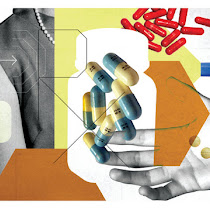While travelers return from a adventure, they typically hope to bring returned some souvenirs, images and maybe a barely one of a kind angle on the arena.
However, they'll be bringing some thing more harmful lower back with them as well. No longer only did travelers convey back genes that rendered their intestine bacteria resistant to antibiotics, it took as low as days for it to happen, consistent with the consequences of a have a look at offered currently at a convention of the american society for microbiology.
Petra wolffs, a researcher at the maastricht college scientific centre within the netherlands, and her group observed dutch tourists to canada, china, india, south korea and the philippines. They took stool samples and hand swabs from them each day, as new scientist reviews. Then, the crew analyzed the genomes of the bacteria they located in vacationers’ digestive systems so one can study how they picked up genetic information from nearby bacteria. In india, the gene switch took simplest two days for some tourists.
The researchers seemed specifically at genes that confer resistance to antibiotics, together with mcr-1, which presents bacteria immunity to colistin, a “last-inn” antibiotic, and qnrb, which makes micro organism proof against quinolone, some other vital antibiotic.
Numerous tourists in india picked up the qnrb gene, and a separate look at confirmed that seven dutch vacationers out of a sample of 122 picked up the mcr-1 gene. Another gene, referred to as ctx-m and recognized to wreck penicillin, changed into found in a few tourists coming back from south-east asian international locations as well.
Whilst the vacationers’ didn’t choose up these genes themselves, they had been present in their gut micro organism. The microbes that populate our digestive device are beneficial for the maximum component, and play an critical role in digestion and other physical tactics. If those bacteria can select up genes that confer resistance to tablets, however, it’s likely that extra lethal bacteria can as properly, doubtlessly accelerating the spread of a couple of-drug resistant antibiotics round the sector. The first pressure of micro organism owning a resistance to colistin become suggested in the americain might also, and more cases are possibly to appear.
Wolffs previous research showed that worldwide travel led to gene switch, and her trendy observe well-knownshows that it is able to happen in the time it takes to shake off the jet lag. What’s greater, the genes caught around within the vacationers’ guts for as much as a month after returning, adequate time for them to spread.
Countries such as india are much more likely to peer cases of antibiotic resistant bacteria because of negative health conditions and a greater incidence of ailment that supply bacteria more possibilities to adapt resistance. While not one of the human beings in the examine suffered any unwell consequences from their microscopic hitchhikers, people with bad immune systems can be at a higher hazard.
However, they'll be bringing some thing more harmful lower back with them as well. No longer only did travelers convey back genes that rendered their intestine bacteria resistant to antibiotics, it took as low as days for it to happen, consistent with the consequences of a have a look at offered currently at a convention of the american society for microbiology.
Hitching a journey
Petra wolffs, a researcher at the maastricht college scientific centre within the netherlands, and her group observed dutch tourists to canada, china, india, south korea and the philippines. They took stool samples and hand swabs from them each day, as new scientist reviews. Then, the crew analyzed the genomes of the bacteria they located in vacationers’ digestive systems so one can study how they picked up genetic information from nearby bacteria. In india, the gene switch took simplest two days for some tourists.
The researchers seemed specifically at genes that confer resistance to antibiotics, together with mcr-1, which presents bacteria immunity to colistin, a “last-inn” antibiotic, and qnrb, which makes micro organism proof against quinolone, some other vital antibiotic.
Numerous tourists in india picked up the qnrb gene, and a separate look at confirmed that seven dutch vacationers out of a sample of 122 picked up the mcr-1 gene. Another gene, referred to as ctx-m and recognized to wreck penicillin, changed into found in a few tourists coming back from south-east asian international locations as well.
Well-traveled micro organism
Whilst the vacationers’ didn’t choose up these genes themselves, they had been present in their gut micro organism. The microbes that populate our digestive device are beneficial for the maximum component, and play an critical role in digestion and other physical tactics. If those bacteria can select up genes that confer resistance to tablets, however, it’s likely that extra lethal bacteria can as properly, doubtlessly accelerating the spread of a couple of-drug resistant antibiotics round the sector. The first pressure of micro organism owning a resistance to colistin become suggested in the americain might also, and more cases are possibly to appear.
Wolffs previous research showed that worldwide travel led to gene switch, and her trendy observe well-knownshows that it is able to happen in the time it takes to shake off the jet lag. What’s greater, the genes caught around within the vacationers’ guts for as much as a month after returning, adequate time for them to spread.
Countries such as india are much more likely to peer cases of antibiotic resistant bacteria because of negative health conditions and a greater incidence of ailment that supply bacteria more possibilities to adapt resistance. While not one of the human beings in the examine suffered any unwell consequences from their microscopic hitchhikers, people with bad immune systems can be at a higher hazard.







0 comments: